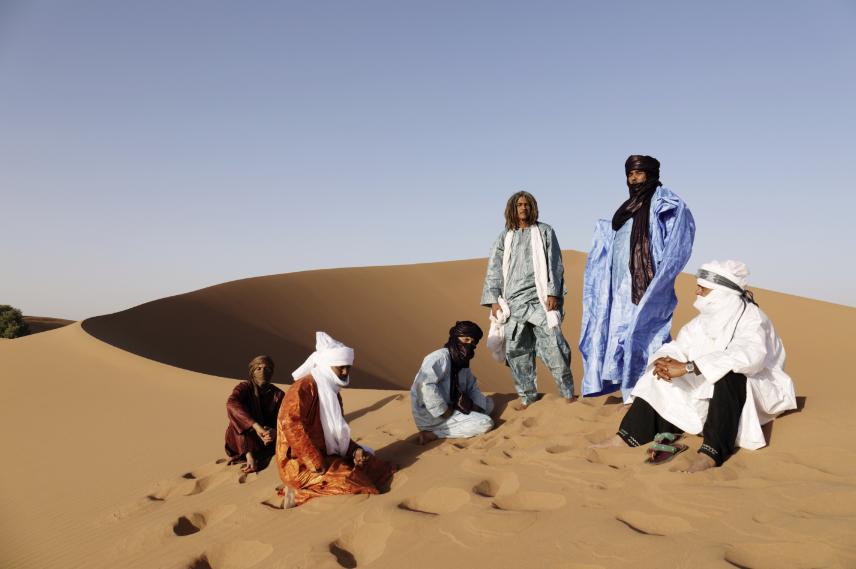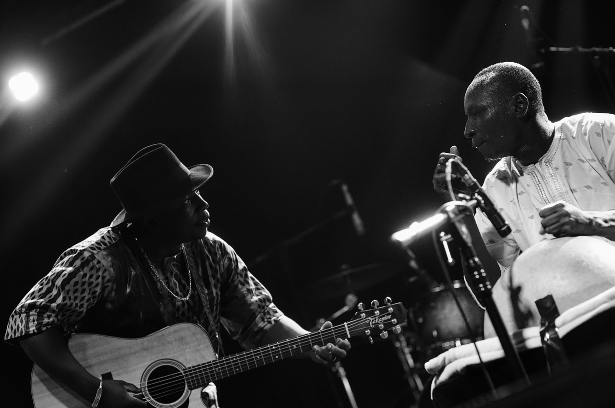
Two of Mali’s great musical forces are headed to Utah this spring: Grammy-award-winning Tuareg refugee rock and desert blues band Tinariwen and rock-reggae musician Vieux Farka Touré (son of legendary Malian blues musician, Ali Farka Touré). Mali has received much attention for its impact on the World music genre, largely thanks to Tinariwen and Vieux Farka Touré’s styles of mixing ancient instruments with modern electric guitars. In 2012, Tinariwen’s fifth album, Tassili, won the group a Grammy for Best World Music Album. And both groups were invited to play in the 2010 FIFA World Cup Opening Ceremonies in South Africa. Now CATALYST magazine and the State Room bring Tinariwen, with special guest Dengue Fever, to Salt Lake on April 7, touring their new album, Elwan. On May 9, Vieux Farka Touré presents his new album, Samba, also at the State Room.
Long before these musicians were playing, it was Vieux’s father, Ali Farka Touré, who first put Mali on the map. Ali Farka Touré (1939-2006), known as the “African John Lee Hooker” for his blues-y mastery of the guitar, won two Grammys and earned a place on Rolling Stone’s list of 100 Greatest Guitarists of all Time. Ali was raised in a small town on the Niger River called Niafunké, in central Mali (in 2004 he became mayor of his hometown). His musical success began in 1976 with the release of his self titled first album.
Throughout his life Ali Farka Touré channeled most of his success into humanitarian work back home. Some of Ali’s final recordings are as a guest on his son Vieux’s first album which came out in 2006, the year Ali succumbed to bone cancer. Incidentally, it was Ali Farka Touré’s music that influenced members of Tinariwen (who themselves later influenced the music of Vieux Farka Touré).

Mali, the homeland of Tinariwen and the Farka Toure family, is a diverse country with 12 national languages, the official language being French, a result of colonial rule the lasted through the 19th century ending in 1960. Tinariwen and the Farka Touré clan hail from two of the many different Malian minority ethnic groups. Vieux Farka Touré comes from the Sonrai people who speak Songhay. Tinariwen are of the Tuareg people, a semi-nomadic group of the Sahara whose language is called Tamasheq.
Tuaregs have long been a politically underrepresented group in Mali. In 1963, Tuareg rebels led an uprising, which was quickly crushed by the Malian government. After the uprising, many Tauregs living in Mali took refuge in Algeria and Libya. Bandleader Ibrahim Ag Alhabi (lead guitar, vocals, and dance) was just a young boy when his family fled to Algeria after witnessing the execution of his father, a Taureg rebel sympathizer.
Though considered a Malian band because of its sound, Tinariwen was formed in Tamanrasset, Algeria. The band’s name is the plural form of Tenere, meaning “Desert” in Tamasheq. Tinariwen’s music and lyrics are personal stories of political oppression, injustice and refugee life. The band grew through the 1980s as the Tuareg musicians met in military training camps, some under command of Libyan ruler Muammar al-Gadaffi and later camps led by a Taureg rebel group in Algeria. Their early music was produced in a makeshift recording studio and distributed through the training camps via cassette tape. Soon Tinariwen became the voice of the Tuareg people. In 1990, another Taureg rebel uprising occurred in Mali, in which some of the band members participated, earning their title from NPR as “music’s true rebels.”
”I grew up listening to Tinariwen, so I consider them as important elders to me,” Vieux told me in an email interview. “Of course they are very important to the people of Mali, especially the Tuareg people in the North. They are like the godparents of Tuareg music today just like Ali, my father, was the godfather of Sonrai music today.”
Tinariwen’s newest album, Elwan, means elephant. “It is a metaphor which symbolizes the big corporations, administration, radical businessmen who have responsibility in our political problem in the Sahara,” writes Tinariwen member Abdallah Ag Alhousseyni. “Our land resembles the aftermath of Elephants crossing our gardens!”
The sound and the feel of their new album is that of a weary calm. The music is best visualized in their animated music video of the album’s single, “Ténéré Tàqqàl,” (What Has Become of the Tenere) directed by Axel Digiox. The video is a vibrant, mish-mashed desert hallucination of a jeep and a camel slowly wandering through the desert with guitars, amps and old tea sets beset by a black dust storm.
This album, unlike their previous work, features some English vocals in the song “Nànnuflày,” the lyrics saying, “No more sleep walking. Keep me with you, God. It’s alright. It’s alright.” Elwan also features appearances by Kurt Vile, Mark Lanegan (of Screaming Trees), Alain Johannes (Queens of the Stone Age), and guitarist Matt Sweeney. “About the artistic aspects (of Elwan), we are really happy with all the experience thus far, as well as the results of some collaborations, very spontaneous and very welcome!” writes Ag Alhousseyni.
Even without lyrical translation, Tinariwen’s genuine message to persevere against oppression transmutes the language barrier in a mysterious, almost primal way. The percussive and intricate guitar riffs often leave one in a trance. This upcoming show will be their fourth time in Utah.
This will also be a return visit to Utah for Vieux Farka Touré . “Utah is not a place that I get to very often when I tour in the US, but it is one of my favorite places to visit,” he says. “It is a beautiful place in terms of the nature and the landscape, but more importantly the people are wonderful. I have very fond memories of Utah and the warm welcome I received there. I am very happy to return and have the opportunity to make more memories there.”

Vieux is known as “The Hendrix of the Sahara.” Distinct from his father’s blues-oriented style Vieux’s’ new album, Samba, kicks of with a killer reggae-rock guitar riff in the song “Homafu Wawa.” Produced by Woodstock Sessions, Samba was recorded in front of a live audience. “There was a feeling of magic in the air when we recorded. The influences of this album, much like all that I do in music, are my family and my country. These are the things that inspire me to write songs,” writes Vieux.
The most meaningful song for Vieux is “Samba Si Kairi” meaning “second born son” in Sonrai. “This song talks about my childhood, my parents,” Vieux writes, “My grandfather would sing ‘Samba Si Kairi’ to me as a child and I would dance. Samba who never breaks, who never runs from threats, who is not afraid. This song is an homage to my grandparents who gave me a nice childhood.”
Vieux was born in 1981, in Niafunké. His father wanted him to be a soldier, to save him from the stress of the music profession. Vieux had other plans. He attended music school in the capital city of Bamako where he studied percussion and secretly learned the guitar.
Vieux finally earned his father’s blessing for a music career right before his father’s passing. With this new album, Vieux celebrates his father’s legacy. “I want to not just honor him but to continue his work in music and in humanitarian projects at home. He was a man who was larger than life so this is a very serious challenge for me, but it keeps me motivated every day to do the best that I can for him.”
Vieux’s humanitarian nonprofit, Amahrec Sahel, provides aid to the entire region of the Sahel (the stretch of land across the widest part of the African continent), not just in Mali. The organization supports services and development in rural areas focusing on education, agriculture, livestock, cultural exchanges and orphanages.

When Vieux first played in Utah at the 2009 Utah Arts Fest, he made a connection with the local nonprofit, Oulessabougou Alliance Utah. A 31-year-old organization, OAU, was started by a group of Utahns who adopted Oulessabougou, a southern region of Mali, as a sister community. They currently have education, water infrastructure and health projects in 24 villages in the region. (See details below).
To have two bands from Mali in such close succession is certainly a treat for Utahns. “It is great to see how the Malian scene could always travel around the world as it is a country with a lot of different cultures, so rich, each one!” writes Tinariwen lead guitarist, Touhami Ag Alhassane. Vieux is also pleased to know that his Malian brothers will be playing in Salt Lake just ahead of his arrival. “This makes me happy,” he says, “because Mali is a very small country, very very far from Utah. But still, you will have two Malian artists perform in a short amount of time. This is a testament to the strength of Mali’s music and culture.”
The SLC/Mali connection:
Utah’s Oulessebougou Alliance provides opportunities for Utahns to learn about Malian culture and history in the global community and organizes projects in education and health that are helping over 25,000 villagers in Mali’s Oulessebougou region.
The Oulessebougou Alliance annual gala fundraiser is April 8 at the Little America Hotel. Dinner, a silent and a live auction will take place. Auction items include a large selection of art and vacation packages to destinations such as Hawaii, Moab, St. Augustine, and a 7-day cruise on the Holland-America cruise line. Tickets:
$125 per person.
www.lifteachother.org
Sophie Silverstone is CATALYST’s community outreach director and music writer.
